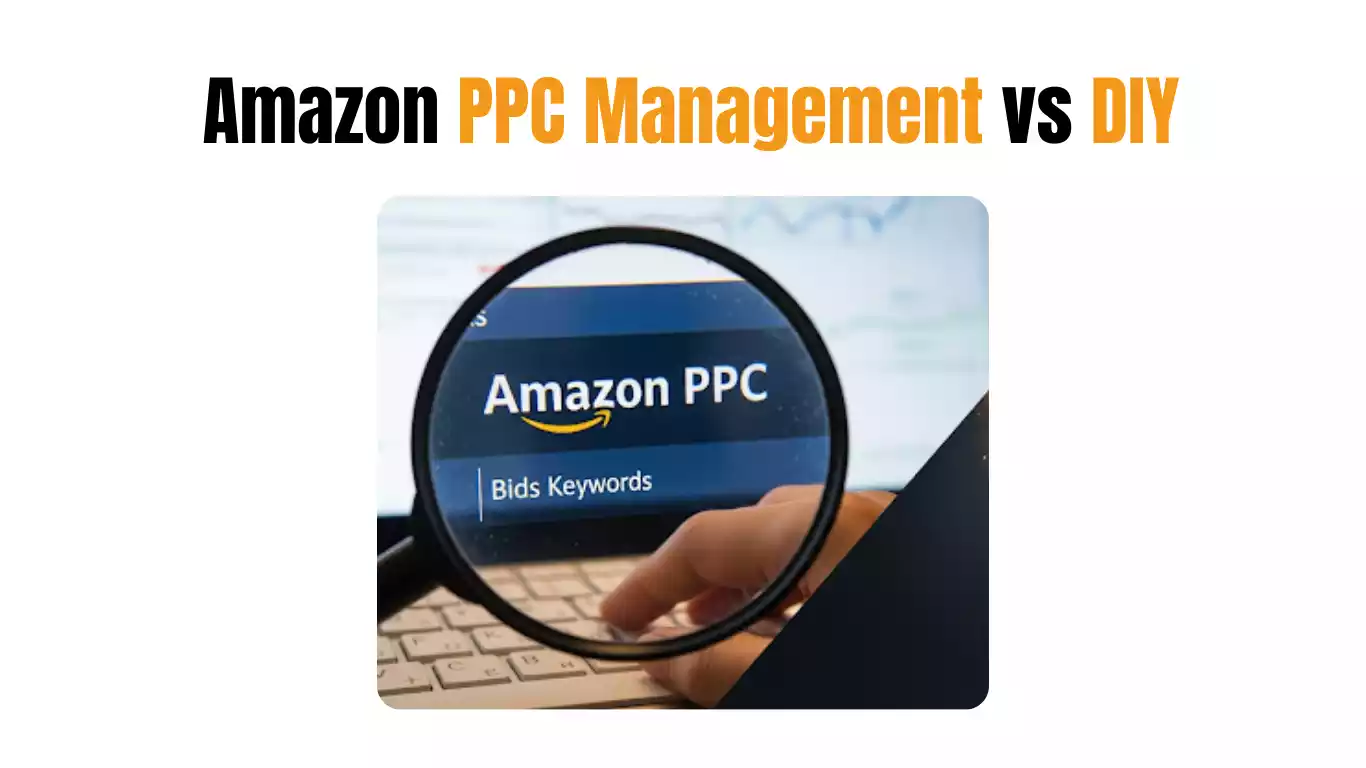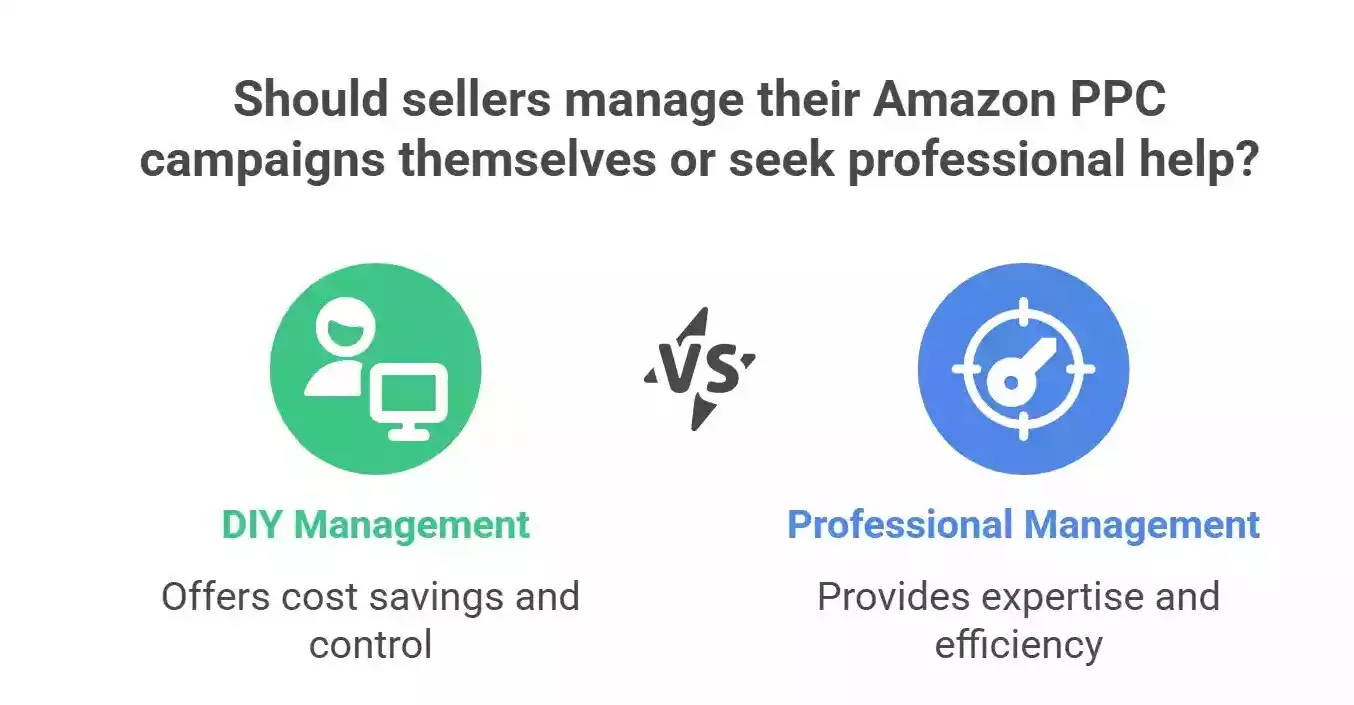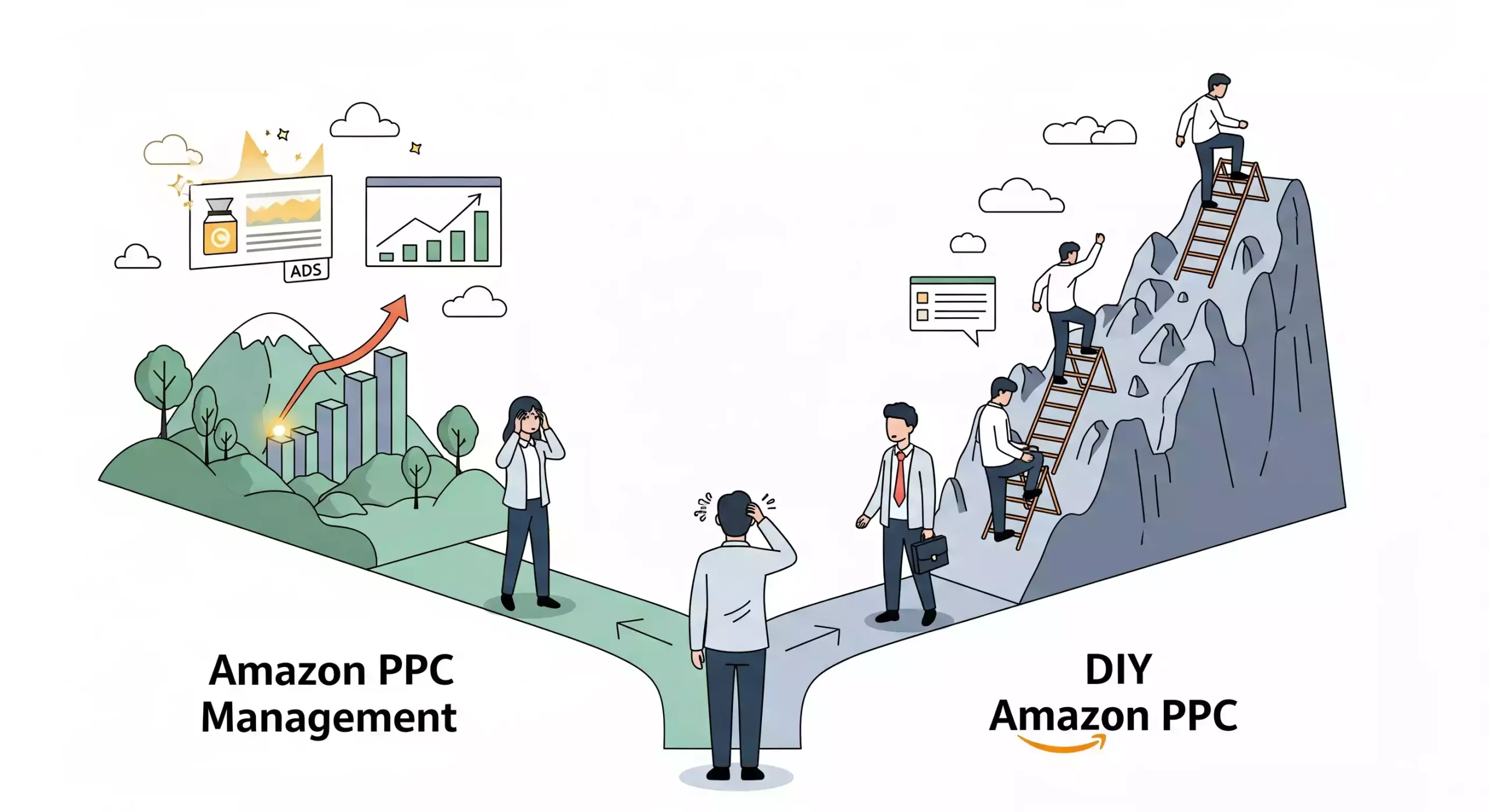
Selling on Amazon has become more competitive than ever. With millions of sellers and countless products listed, simply uploading your items is not enough to drive sales. To stand out, many businesses turn to Amazon PPC management as a way to generate visibility and reach customers. But here comes the big question: should you manage your Amazon PPC campaigns yourself (DIY), or should you hire professionals who offer Amazon PPC management services?
This article breaks down the differences, pros, cons, and best practices, and provides a practical guide to help you decide what’s best for your business.
What Is Amazon PPC Management?
Amazon PPC management is the process of setting up, running, and optimizing pay-per-click campaigns on Amazon. With PPC, sellers pay only when a shopper clicks their ad. These ads appear on search result pages, product detail pages, and even off-Amazon placements.
Management involves more than just creating an ad; it requires keyword research, bid adjustments, performance tracking, and campaign scaling. Businesses often hire agencies or professionals who specialize in Amazon PPC campaign management to ensure their ads bring maximum return on investment (ROI).
Why Amazon PPC Matters for Every Seller
Amazon’s algorithm favors products that sell well. PPC ads bring those initial sales that can push your product higher in organic rankings. Without ads, many sellers struggle to gain visibility, especially when launching new items.
Visibility boost: Ads put your product in front of ready-to-buy shoppers.
Sales acceleration: Faster conversions compared to waiting for organic growth.
Ranking improvement: PPC-driven sales improve natural visibility.
Brand credibility: A product that shows up in top results appears more trustworthy.
Whether managed in-house or by experts, PPC is no longer optional- it’s a necessity.
DIY Amazon PPC Management
DIY PPC management means you take full responsibility for setting up and optimizing your advertising campaigns. Sellers usually use Amazon’s built-in advertising console to handle tasks like keyword research, ad creation, and monitoring.

Advantages of DIY
Cost Savings
No agency or consultant fees, only the ad spend itself.
Full Control
Sellers know their products best and can make immediate changes.
Learning Experience
Managing your own ads provides valuable insights into customer behavior.
Disadvantages of DIY
Steep Learning Curve
PPC involves understanding Amazon’s algorithm, keyword bidding, and campaign structures.
Time Consuming
Sellers must monitor campaigns daily to prevent wasted ad spend.
Risk of Overspending
Without expertise, campaigns can drain budgets with little return.
Professional Amazon PPC Management Services
Professional services are offered by agencies or consultants specializing in Amazon ads. They handle everything from keyword research to campaign optimization. These experts often use advanced tools, software, and years of experience to manage ads more effectively.
Advantages of Professional Services
- Expertise and Experience
- Time Efficiency
- Better ROI
- Scalability
1. Expertise and Experience
Amazon PPC agencies have deep knowledge of how the platform works, including bidding strategies and keyword research. They stay updated with Amazon’s frequent policy changes, ensuring campaigns follow best practices. This expertise saves sellers from costly mistakes and improves performance from day one.
2. Time Efficiency
Managing PPC requires daily monitoring, keyword adjustments, and bid optimization. By outsourcing to professionals, sellers free up time to focus on product development, customer service, and scaling operations. This balance keeps the business running smoothly without ads becoming a burden.
3. Better ROI
Agencies continually refine campaigns to minimize wasted ad spend and increase conversions. Their data-driven approach helps stretch every advertising dollar further. As a result, sellers see stronger profits and sustainable growth compared to trial-and-error DIY methods.
4. Scalability
As your business expands with more products or entry into new markets, agencies adjust campaigns seamlessly. They can handle larger budgets, complex targeting, and multi-market strategies. This ensures growth is supported by a strong advertising foundation without overwhelming the seller.
Disadvantages of Professional Services
- Cost
- Less Direct Control
- Variable Quality
1. Cost
Working with an Amazon PPC agency requires paying management fees in addition to your advertising budget. For small or new sellers, these costs can feel heavy before sales volume grows. While the investment can pay off, it’s still a financial barrier to consider.
2. Less Direct Control
When you outsource PPC management, you’re handing over daily decisions to another team. This means you may not see or adjust every detail yourself. Sellers need to build trust and communication with the agency to stay aligned with business goals.
3. Variable Quality
Not all Amazon PPC agencies have the same level of skill or experience. Some may overpromise and underdeliver, wasting both time and money. Careful research, reviews, and case studies are essential before choosing a partner.
Key Elements of Amazon PPC Campaign Management
Whether DIY or professional, successful PPC management requires attention to these elements:
1. Keyword Research
Identifying terms shoppers use to find products.
2. Campaign Structure
Organizing ads into Sponsored Products, Sponsored Brands, or Sponsored Display.
3. Bid Optimization
Adjusting CPC bids to maintain profitability.
4. Negative Keywords
Filtering out irrelevant search terms to save money.
5. Performance Tracking
Monitoring metrics like click-through rate (CTR), ACoS (Advertising Cost of Sales), and ROAS.
6. Scaling
Expanding profitable campaigns to increase revenue.
Amazon PPC Management: DIY vs Professional Services

Here’s a side-by-side comparison to help visualize the differences:
| Factor | DIY PPC Management | Professional PPC Management Services |
| Cost | No management fees, only ad spend | Management fees + ad spend |
| Expertise | Limited to the seller’s knowledge | Experienced professionals with proven tactics |
| Time Investment | High – requires daily monitoring | Low – handled by agency/consultant |
| Risk of Wasted Spend | Higher due to inexperience | Lower due to optimization techniques |
| Scalability | Difficult to expand across many products | Easy to scale with advanced strategies |
| Learning Curve | Steep, requires trial and error | Minimal for seller, as experts handle it |
Step-by-Step Guide to Setting Up an Amazon PPC Campaign
If you decide to go DIY, here’s a simple process to follow:
Step 1: Choose Your Campaign Type
- Sponsored Products: Focused on individual products.
- Sponsored Brands: Highlight multiple products and your brand logo.
- Sponsored Display: Retarget shoppers who viewed but didn’t buy.
Step 2: Do Keyword Research
Use tools like Amazon’s Keyword Planner, Helium 10, or Jungle Scout. Focus on long-tail keywords such as “wireless noise-canceling headphones” instead of just “headphones.”
Step 3: Set Your Budget and Bids
Decide how much you’re willing to spend daily. Start small (e.g., $20–$50 per day) and adjust bids based on performance.
Step 4: Create Campaign Structure
Separate campaigns by product type or keyword theme. This keeps tracking easier and avoids mixing unrelated data.
Step 5: Launch and Monitor
Go live and track impressions, clicks, and conversions daily. Watch for early signs of wasted spend.
Step 6: Optimize Regularly
- Add negative keywords to cut irrelevant traffic.
- Adjust bids to increase profitable clicks.
- Pause underperforming keywords and scale winners.
Common DIY Mistakes to Avoid in 2025
Many sellers fail because they repeat the same mistakes. Here are the biggest ones to avoid:
Ignoring Voice Search Keywords
More buyers use Alexa and mobile voice search. Phrases like “best budget running shoes” matter in 2025.
Not Leveraging Video Ads
Amazon’s Sponsored Brands Video is one of the most effective formats, yet many DIY sellers skip it.
Overusing Broad Match Keywords
Broad match drains budgets. Use exact and phrase match for tighter targeting.
Failing to Adjust for Seasonality
Ads should shift for seasonal peaks (e.g., Christmas, Black Friday). DIY sellers often miss these opportunities.
Neglecting Mobile Optimization
A majority of Amazon traffic is mobile. Ads should prioritize placements that work well on smaller screens.
When to Choose DIY Amazon PPC Management
DIY is a good option if:
- You are a beginner
- You want to learn
- Your catalog is small
- You have enough time to monitor and optimize daily.
When to Choose PPC
You are a beginner testing Amazon PPC with a small budget
If you’re just starting, managing ads yourself helps you learn the basics without spending too much. A small budget limits risk and gives you time to understand how keywords, bids, and clicks work.
You want to learn how PPC works before investing in services
DIY gives sellers first-hand experience with Amazon’s advertising system. By testing campaigns yourself, you’ll better understand what agencies do and be able to evaluate them later with confidence.
Your catalog is small (one or two products)
Sellers with only a few products often find DIY manageable. Fewer listings mean fewer campaigns to track, making it easier to experiment and optimize ads without outside help.
You have enough time to monitor and optimize daily
PPC requires frequent checks, keyword adjustments, and bid updates. DIY is only practical if you can dedicate daily time to maintain campaigns; otherwise, performance may slip.
When to Choose Professional Amazon PPC Management Services
Professional services are better if:
- You are scaling a store with multiple products.
- Your monthly ad spend is high, and wasted spend would cost thousands.
- You want faster, more reliable results.
- You prefer focusing on sourcing, branding, and customer service instead of ads.
A Real Example
Consider two sellers launching similar kitchenware products.
Seller A (DIY)
Manages ads personally, spends hours daily adjusting bids, but misses advanced keyword opportunities. Sales improve slightly, but profits remain thin.
Seller B (Professional)
Hires a PPC agency that optimizes campaigns with exact match keywords, retargeting ads, and competitor targeting. Within three months, Seller B’s sales triple, and ACoS drops by 20%.
The difference lies in experience, time, and optimization.
FAQs About Amazon PPC Management
1. Is Amazon PPC management worth it?
Yes, because PPC drives visibility, sales, and organic ranking growth.
2. How much do professional Amazon PPC management services cost?
Costs vary, some charge a percentage of ad spend, others a flat monthly fee.
3. Can I start PPC on a small budget?
Yes, even $10–$20 a day can generate results if campaigns are optimized.
4. What’s the biggest risk of DIY PPC?
Wasting money on irrelevant clicks due to poor targeting.
5. Can PPC alone grow my Amazon business?
It helps significantly, but combining it with strong product quality and reviews is essential.
Conclusion
Amazon PPC management is one of the most important tools for sellers aiming to succeed on the platform. The choice between DIY and professional services depends on your goals, budget, and time.
If you’re just starting, DIY gives you control and experience. But if you’re serious about scaling, investing in Amazon PPC management services delivers better ROI, saves time, and ensures campaigns are optimized for growth.
In the end, both paths lead to sales, but one may take longer and cost more in trial and error. For sellers who want sustainable success, trusting experts in Amazon PPC campaign management is often the smarter move.